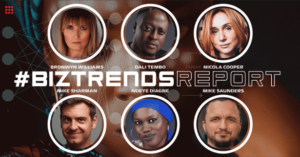From A to where
Successful digital leaders are like hikers on a trail in the wilderness. They understand that the path they start on may not be the one that leads them to their destination, but they remain open to discovering new trails and adjusting their route along the way. Instead of simply following a fixed route, they are constantly forging new paths and creating new opportunities for themselves and their teams. In this way, they are like adventurers exploring new terrain, continually looking for new approaches and adapting to their challenges.
Technological Vision
Successful digital leaders with vision are in high demand in today’s rapidly changing business landscape. According to the World Economic Forum, these leaders possess the critical ability to interrogate multiple data sets and uncover deep customer and employee insights, which they can use to drive their organisation’s digital strategy forward.
But it’s not just about data analysis. HR Dive notes that a typical digital vocabulary is also necessary for top digital organisations. Digital leaders must develop and model this vocabulary to fully function and operate as a unified digital force where technology and behaviour development coexist seamlessly. This shared language must include new technologies and clearly articulate the organisation’s digital transformation vision.
Successful digital leaders with vision understand that data analysis and a shared language are just the beginning. They also keenly understand how technology and behaviour development intersect and work together. By fostering a culture of innovation and collaboration, they empower their teams to create new opportunities and drive the organisation forward in the digital age.
Successful digital leaders with vision are analytical, creative, strategic, and collaborative. They can inspire their teams to achieve greatness by leveraging data, developing a shared language, and fostering a culture of innovation. They are the driving force behind the success of top digital organisations, and their importance will only continue to grow as the business world becomes increasingly digital.
Always on Mindset
Google is the only one who presented this idea, and I believe it is essential to good digital leadership. Rather than viewing digital transformation as a one-time project, digital leaders steer with an adaptive, always-on mindset to improve and scale pilots as the landscape changes and they prove their ROI. As technology, markets, and consumer behaviours constantly evolve, so will your approach to digital transformation. A cultural reset is required to get comfortable with constant pivots.
Successful digital leaders constantly experiment and learn, invest in flexible planning and budgeting, and build cross-functional teams that start at the C-suite level. Google’s research indicates that these behaviours are not just isolated actions but have become deeply embedded in the company culture of digital leaders. As C-level executives align to invest in a robust digital foundation, they become increasingly skilled at using internal data to make informed decisions when faced with operational challenges.
An adaptive and always-on mindset enhances a business’s capacity to rethink and redesign its customer experiences. By collaborating across different functions, digital leaders can more effectively identify which customer-centric opportunities should be rapidly expanded and which unsuccessful or slow-moving initiatives should be abandoned.
An Agile Approach to Collaboration
Digital leaders require an agile collaboration approach to thrive in today’s constantly evolving business environment. The World Economic Forum notes that this requires a fundamental redesign of organisational processes and technology to break down the barriers between business and IT.
To achieve this, HR Dive advocates for a shift away from traditional hierarchical leadership structures and instead encourages organisations to identify and empower influencers within their industry and organisation. These individuals possess first-hand knowledge of customer concerns and can provide valuable insights that inform decision-making at the top level.
Furthermore, Apoorva Chhabra from Gartner highlights the importance of balancing innovation and replication in digital collaboration. While trailblazing is admirable, it may not always be practical or effective. Successful digital leaders know when to innovate and replicate existing strategies to drive growth and improve customer experiences.
Overall, an agile approach to collaboration is critical for digital leaders to navigate the complex and constantly changing business landscape. By breaking down silos between business and IT, empowering influencers, and balancing innovation with replication, digital leaders can drive organisational success and create a culture of innovation that can adapt to any challenge.
They do not consider digital to be the outcome.
I have been jumping all over this soapbox as a keynote speaker for the last few years with my TEDx Talk and Humancentric book. I’m not the only one; my message is not unique but essential. Technology is an accelerator for human potential.
As Gartner puts it, “Nobody digitalises just to be digital, just as Nobody transforms just to transform. Be sure to define and articulate the reason for digitalising clearly. If you digitalise without that kind of extra-clear hard-edged goal, you can end up in bad places.”
Organisational management
According to Google’s research, 72% of digital leaders say consistent C-level Collaboration is essential, and 82% claim to align across the executive suite on the digital vision, investment, and other resources to drive the agenda forward together.
Becoming a digital leader begins at the top. Companies succeed when digital transformation isn’t just the remit of one executive but the entire C-suite aligns on a common strategy and road map. Once they’ve set the North Star, CxOs must work together to galvanise the whole organisation to execute the vision from the top down.
World economic forum says the ability to reorganise the workforce to take advantage of humans’ capacity to undertake higher-value, judgement-based work. This is heavy corporate speech, so I asked ChatGPT to simplify it for ordinary folk like me. “The World Economic Forum suggests that companies should find ways for their employees to do more important work that involves thinking and making decisions instead of just doing simple tasks. This can help businesses be more successful.”
I also like how Intelment.com add a new dynamic to organisational management by suggesting digital leaders strike a delicate balance between legacy systems and innovation, etching the digital era. They have a broad understanding to delve into balancing the organisation’s strategies. The pace at which technology is mitigating has necessitated the need to stand by the same to strive for success. And digital leaders know precisely when to strike the rod hot. Digital winners are ones who expertly leverage diversity in the workforce while optimising their current business strategy.
They build teams
They understand the importance of building the right team.
Hiring the right people is the key to business success in the digital age. This involves hiring the right professionals and pairing younger digital enthusiasts with experienced employees. Influential digital leaders look for experts who can improve the company’s efficiency. These leaders gather the best talent from the market to create a team of technologists and digital-savvy leaders. They also understand the value of giving their team members space to be creative, allowing them to make mistakes and learn from them.
Google talks about this as building capabilities. They go as far as suggesting that good digital leaders drive specific agendas.
For example, they sight leaders who take advantage of first-party data, connect digital solutions to their tech stacks using APIs and microservices, and emphasise proper data governance procedures – this paves the way for a continuous supply of high-quality data that teams use appropriately and consistently.
Empathy
Digital transformation is a comprehensive process that redefines business operations, creates new customer ecosystems, and emphasises the importance of meeting customer needs through product and service offerings. HR Dive emphasised the importance of putting the customer at the forefront of decision-making processes for organisations with strong digital leadership. The World Economic Forum also suggests that empathy is critical for digital leaders to understand the views of customers, clients, employees, and end-users, providing insight and motivation to do what is best for them.
Leveraging digital technology within an organisation provides an opportunity to show more profound empathy towards customers. By utilising data and analytics, organisations can better understand customers’ needs and preferences, allowing for more personalised and tailored offerings. Additionally, digital channels like social media allow businesses to engage with customers in real-time, respond to their needs and concerns, and foster community. Ironically, by leveraging digital tools and capabilities, organisations can become more human by showing outstanding care and respect towards their customers.
Leaders are agents of change.
Successful leaders in the digital age must possess agility and act as agents of change. Leaders must foster a culture of tolerance, take calculated risks, and learn from their successes and failures. They must also be willing to lead and manage change within their teams and themselves. Digital leadership requires adaptability, flexibility, and a growth mindset, as the digital landscape constantly evolves. The most effective leaders are those who embrace change and use it as an opportunity for growth and innovation.
As Aproova would phrase it, “Digital leaders are neophiliacs” – a personality type characterised by a strong affinity for novelty. In Gartner’s research, digital leaders show deep desires to have and create new experiences, which echoes the desires and capabilities of navigating and leading teams through change.






